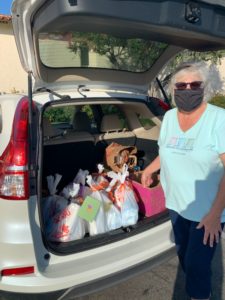 Doing good things during these difficult times for Ventura the Ventura Townehouse donated some of their resources by showing their support for the people on the front lines at Community Memorial Hospital. VTH donated thousands of masks, hundreds of gowns and donated gift cards of meals and coffee from local coffee shops and diners. They also supplied much needed sundries of toilet paper, paper towels, shampoo, conditioner, soap and hand sanitizers to the local senior mobile home parks. They also created a pen-pal at the mobile home parks where their residents correspond with the seniors at the mobile home parks.
Doing good things during these difficult times for Ventura the Ventura Townehouse donated some of their resources by showing their support for the people on the front lines at Community Memorial Hospital. VTH donated thousands of masks, hundreds of gowns and donated gift cards of meals and coffee from local coffee shops and diners. They also supplied much needed sundries of toilet paper, paper towels, shampoo, conditioner, soap and hand sanitizers to the local senior mobile home parks. They also created a pen-pal at the mobile home parks where their residents correspond with the seniors at the mobile home parks.
Category Archives: Coronavirus
Beware of scams and fraud schemes
 The Office of Inspector General recognizes that we are facing unprecedented times and is alerting the public about potential fraud schemes related to economic stimulus programs offered by the U.S. Small Business Administration in response to the Novel Coronavirus Pandemic (COVID-19). The Coronavirus Aid, Relief, and Economic Security Act (CARES Act), the largest financial assistance bill to date, includes provisions to help small businesses. Fraudsters have already begun targeting small business owners during these economically difficult times. Be on the lookout for grant fraud, loan fraud, and phishing.
The Office of Inspector General recognizes that we are facing unprecedented times and is alerting the public about potential fraud schemes related to economic stimulus programs offered by the U.S. Small Business Administration in response to the Novel Coronavirus Pandemic (COVID-19). The Coronavirus Aid, Relief, and Economic Security Act (CARES Act), the largest financial assistance bill to date, includes provisions to help small businesses. Fraudsters have already begun targeting small business owners during these economically difficult times. Be on the lookout for grant fraud, loan fraud, and phishing.
SBA does not initiate contact on disaster loans or grants. If you are proactively contacted by someone claiming to be from the SBA, suspect fraud.
If you are contacted by someone promising to get approval of an SBA loan, but requires any payment up front or offers a high interest bridge loan in the interim, suspect fraud.
SBA limits the fees a broker can charge a borrower to 3% for loans $50,000 or less and 2% for loans $50,000 to $1,000,000 with an additional ¼% on amounts over $1,000,000. Any attempt to charge more than these fees is inappropriate.
If you have a question about getting a SBA disaster loan, call 800-659-2955 or send an email to [email protected].
If you have questions about other SBA lending products, call SBA’s Answer Desk at 800-827-5722 or send an email to [email protected].
Phishing
If you are in the process of applying for an SBA loan and receive email correspondence asking for PII, ensure that the referenced application number is consistent with the actual application number.
Look out for phishing attacks/scams utilizing the SBA logo. These may be attempts to obtain your personally identifiable information (PII),to obtain personal banking access, or to install ransomware/malware on your computer.
Any email communication from SBA will come from accounts ending with sba.gov.
The presence of an SBA logo on a webpage does not guaranty the information is accurate or endorsed by SBA. Please cross-reference any information you receive with information available at www.sba.gov.
Report any suspected fraud to OIG’s Hotline at 800-767-0385 or online at, https://www.sba.gov/about-sba/oversight-advocacy/office-inspector-general/office-inspector-general-hotline.
The pandemic’s threat to older workers
by Marci Phillips NCOA’s Director of Public Policy and Advocacy
The COVID-19 pandemic has caused a staggering loss of jobs. At the end of March, the Bureau of Labor Statistics reported that 7.1 million Americans were unemployed, with numbers projected to rise further throughout April.
In 2019, roughly 1 in 5 older adults aged 65+ was still in the workforce. Nearly three-quarters were working at jobs where teleworking was not an option. The pandemic has put these seniors at a double risk: being furloughed/laid off or being forced to go into a workplace and put their health at risk.
For older adults, losing a job can be especially difficult. Older workers are more likely to remain out of work for lengthier periods of time compared to their younger counterparts; some may choose not to return to the workforce at all. An AARP survey of older workers found that following the Great Recession, the average duration of unemployment was close to a year for older adults. More recently, last month AARP reported that 19.9% of jobseekers aged 55+ were long-term unemployed, compared with 16.2% of those aged 16 to 54.
While it’s hard to know what the long-term economic fallout will be from the COVID-19 pandemic, there are clues from the last decade, following the 2008 market collapse. A recent issue brief from NCOA and LeadingAge LTSS Center @UMass Boston examined the financial impact of the Great Recession of 2008-09 on adults aged 60+ and found:
Among all age groups, individuals who were retired fared worse than those who were still in the workforce. (Though those who were aged 75+ fared better than those aged 60-74.)
However, although being over age 75 in the workforce meant better income than those retired, it appears that many of these older adults remained in the workforce out of necessity precisely because their overall financial resources and net wealth were worse than those retired.
Unsurprisingly, those with the lowest net worth and financial assets fared worse following the market collapse. A common trend seen across those 60+, regardless of age group or retirement status, was a decrease in total net wealth and taking on greater debts, particularly property related debt, during times of recession.
NCOA is one of several national sponsors of the Senior Community Service Employment Program (SCSEP). Funded by the U.S. Department of Labor (DOL), SCSEP is a training program that helps low-income, unemployed individuals aged 55+ find part-time work and get back on the path to financial stability.
As the nation began to shutter businesses and ask Americans to shelter in place during the onset of COVID-19, NCOA took an unprecedented step to request DOL to allow us to continue to pay SCSEP participants during the pandemic, even if their training sites were closed. For these vulnerable older adults, their SCSEP stipend offers a lifeline during difficult financial times.
NCOA, along with the Leadership Council on Aging Organizations, is urging Congress to provide an additional $500 million in funding for the SCSEP in the next COVID-19 stimulus and relief bill. Additional funding will more than double the program’s current capacity to serve between 56,000 to 128,000 additional eligible individuals that need SCSEP services.
History tells us that older adults are likely to face significant financial hurdles following the COVID-19 pandemic. Investing in programs like SCSEP can ensure that many will have an opportunity to return to the workforce and regain some of their financial footing.
COVID-19 Was Your Retirement Plan Test
by Jayson Cohen American Legacy Solutions
Countless Americans are worried about the impact that Covid-19 will have on the health of their families and friends, and indeed their own well-being. However, there is another concern that could impact you.
In preparing for retirement, investors should prepare for all sorts of investment environments, and that includes downturns like Covid-19. While it may seem out of the ordinary, remember that it has been less than 15 years since the last financial downturn, and while the growth seen over the past ten years has been substantial, it is now clear that it is sandwiched between two bear periods.
Therefore, it is all the more crucial that your retirement plan be prepared for any such eventuality. As painful as one as it has been, Covid-19 is just a test for your finances. Here’s how to check to see if you’re ready.
Diversification is Key
Although many securities are doing poorly right now, there are others that are doing well. Many mail-order retailers, healthcare stocks, and PPE manufacturers are seeing high earnings. Even traditional publishers are seeing an increased demand for books. Plenty of companies stand ready to make substantial profits as a result, and given that it is on a sector by sector basis, diversified portfolios are likely seeing substantial stability.
It is not just about stocks, however. Fixed income, alternative investments, currencies, and commodities have all also seen considerable volatility over the past few weeks, but through that volatility there has been a number of opportunities to gain considerably. Not all of these will be immediate, of course; some may pay considerably in the future. At any rate, diversification is a step that helps you accomplish all of this.
Appetite for Risk
More than just a need for diversification, Covid-19 has also informed a need for knowing what one’s appetite for risk is, no matter what the market conditions may be. Doing this must be done not only with an eye to the future, but with an eye to the individual appetites of the investor in question.
After all, different investors will have different appetites. Some investors may have no problem riding out a storm like Covid-19, confident that the market will prevail. Others, especially those who rely on more actively managed portfolios, may wish to fall back to a safe harbor during such a situation.
The goals of each investor, as well as his/her time left in the market, each play a large role here. Someone who is close to her financial goals may not want to risk eroding what she has gained over the years. Likewise, an investor who is younger and has the benefits of time and compound interest may well wish to search for greater rewards.
At any rate, solid communication and a good plan will help make sure that you are prepared to meet the market on your terms. Rather than treating Covid-19 as a one-off occurrence, by addressing it as a potential market fluctuation that could happen again, you will be better suited to handle it in the future, knowing what could well come as a result, and preserving your net worth regardless of what goes on around you.
Great Plates Meal Program kicks off in Ventura County
On April 24, 2020, Governor Newsom announced the launch of a first-in-the-nation “Great Plates Delivered” program, a meal delivery service for California’s older adults. The program helps seniors and other adults at high risk from COVID-19 to stay home and stay healthy by delivering three nutritious meals a day, and also provides essential economic stimulus to local businesses struggling to stay afloat during the COVID-19 crisis. Local restaurants can learn more about the requirements and how to apply here. Seniors can apply here. Please email [email protected] for more information. Special thanks to Victoria Jump, the Director of the Ventura County Aera Agency on Aging (VCAAA) and Patrick Maynard, Director of the Office of Emergency Services for implementing this program locally in record time. This program enhances the efforts that have already been in place to feed the most vulnerable. More than 250,000 meals have been provided since COVID-19 hit our County. Learn more about VCAAA at www.vcaaa.org/.
The outbreak of infectious diseases such as Covid-19 can be a stressful time. It is not uncommon to feel anxious or worried while listening, reading or watching the news, even if you’re at little to no risk of getting ill yourself. It’s important during times like these to keep track of your own physical and mental health, as well as safely stay connected to your community. Know the signs of stress and when and how to seek help for yourself, as well as loved ones. During this stressful time, don’t forget your own self-care. Take time to breathe, exercise, get plenty of sleep, and take a break from the news and social media periodically.
Ventura County residents can also join the free ongoing online help and support line to connect with others and lean healthy habits to maintain emotional well-being through the pandemic. Learn more at https://giveanhour.org/initiatives-and-programs/covid19-ca/ and https://www.wellnesseveryday.org/coping-during-coronavirus.
Coping with stress
Older people and people of any age who have serious underlying health conditions are at higher risk for severe illness from COVID-19. People who may have issues getting assistance if they become ill, like those experiencing homelessness or people with disabilities are also at increased risk from COVID-19.
These conditions and situations may result in increased stress during this pandemic. Fear and anxiety can be overwhelming and cause strong emotions.
Things you can do to support yourself:
Take breaks from watching, reading, or listening to news stories and social media. Hearing about the pandemic repeatedly can be upsetting.
Take care of your body. Take deep breaths, stretch, or meditate. Try to eat healthy, well-balanced meals, exercise regularly, get plenty of sleep, and avoid alcohol and drugs.
Make time to unwind. Try to do some other activities you enjoy.
Connect with others. Talk with people you trust about your concerns and how you are feeling.
Call your healthcare provider if stress gets in the way of your daily activities for several days in a row.
If you, or someone you care about, are feeling overwhelmed with emotions like sadness, depression, or anxiety, or feel like you want to harm yourself or others call 911.
Have a plan for if you get sick
Know how to stay in touch with others by phone or email. You may need to ask for help from friends, family, neighbors, and community health workers if you become sick.
Determine who can care for you if your caregiver gets sick.
Contact your healthcare provider to ask about obtaining extra necessary medications to have on hand in case there is an outbreak of COVID-19 in your community and you need to stay home for a prolonged period of time.
If you cannot get extra medications, consider using mail-order for medications.
Be sure you have over-the-counter medicines and medical supplies (tissues, etc.) to treat fever and other symptoms. Most people will be able to recover from COVID-19 at home.
Have enough household items and groceries on hand so that you will be prepared to stay at home.
Consider ways of getting medications and food brought to your house through family, social, or commercial networks.
Have a plan for someone to care for your pets during your illness.
Cleaning and Disinfecting Your Home
Check with your local public health officials
Depending on how severe the outbreak is, your local public health officials may recommend community actions to reduce people’s risk of being exposed to COVID-19. These actions can slow the spread and reduce the impact of disease.
Stay home as much as possible. Take extra measures to put distance between yourself and other people to further reduce your risk of being exposed to this new virus.
What to do if you have symptoms
- Watch for symptoms and emergency warning signs.
- Pay attention for potential COVID-19 symptoms including, fever, cough, and shortness of breath.
- If you feel like you are developing symptoms, stay home and call your doctor. Tell them that you have or may have COVID-19. This will help them take care of you and keep other people from getting infected or exposed.
- If you are not sick enough to be hospitalized, you can recover at home.
If you develop emergency warning signs for COVID-19 get medical attention immediately. In adults, emergency warning signs* are:
- Difficulty breathing or shortness of breath
- Persistent pain or pressure in the chest
- New confusion or inability to arouse
- Bluish lips or face
Music from last summer’s Ventura County Fair
George Thorogood performing at last summer’s Ventura County Fair.
The Fair Board unanimously voted to cancel this year’s Fair because of COVID-19 restrictions.
photo credit: Pam Baumgardner
Breeze music scene columnist with members of Collective Soul before their performance last year at the Ventura County Fair.
Ventura Breeze and Jaime Baker congratulate all grads
The Ventura Breeze and Jaime Baker congratulate all of the grads who won’t have a ceremony.
CMHS emergency departments are open and they have clean laundries
Community Memorial Health System is grateful to everyone in the community for doing their part to stop the spread of the Coronavirus by staying home during this time, but now more than ever, CMHS wants people to know that it’s safe to seek care at Community Memorial Hospital and Ojai Valley Community Hospital. If you need care, don’t wait until your condition worsens.
“It’s important that patients not put off coming in to see us when they need care,” said Dr. Neil Canby, Emergency Department physician at Community Memorial Hospital. “We understand that people may be apprehensive to seek care during this time, but we have put a number of policies and procedures in place to protect the health and safety of everyone who enters our hospitals and emergency departments.”
Some of the enhanced policies CMHS has introduced to keep all patients safe, including non-COVID-19 patients, include:
Mandatory Coronavirus (COVID-19) screening for everyone who enters the Emergency Departments and hospital facilities, including patients, essential companions, physicians and staff.
Mandatory use of surgical masks for everyone in the Emergency Departments, regardless of their COVID-19 status.
Continued use of separate treatment areas for patients who present with COVID-19 symptoms and those who do not.
Continued use of separate waiting areas (including waiting in vehicles) and phone registration following appropriate screening, in order to minimize contact and maintain social distancing standards.
Continued use of enhanced sterilization and cleaning protocols of individual patient treatment rooms and entire Emergency Departments to ensure optimal cleanliness and minimize potential spread.
Continued restriction of visitors (one essential companion only) in the Emergency Departments and hospital facilities to limit potential exposures.
CMHS understands that people may be apprehensive to seek treatment during this uncertain time, but encourages people to rely on CMHS for the care the community has come to know and trust.
Community Memorial Hospital’s Emergency Room is located at 147 N. Brent St. (805-652-5011) and the Ojai Valley Community Hospital ER is located at 1306 Maricopa Highway in Ojai (805) 646-1401.
Community Memorial Health System is the first on-premise laundry to achieve the Hygienically Clean Healthcare certification, an important recognition amid growing global concerns about infection control and an especially important achievement during the COVID-19 pandemic.
The laundry department at Community Memorial Hospital and Ojai Valley Community Hospital provides hygienically clean linens, gowns, scrubs and other garments for all physicians, employees, and patients, helping to ensure a clean, safe environment at both hospitals and prevent the spread of illness.
Ventura County Fair Board votes to cancel 2020 Fair
The Ventura County Fairgrounds Board of Directors has voted unanimously to cancel the 2020 Ventura County Fair. The action comes amid unprecedented community stay-at-home and social distancing guidelines and was made to protect guests, vendors, staff and others during the COVID-19 crisis.
The Board considered ongoing guidance and updated information from State and County health care and government officials about the status of the coronavirus pandemic and the improbability that mass gatherings like the Ventura County Fair could safely and responsibly take place this summer.
“Every year thousands of happy faces come through the fair gates to enjoy the County’s most timeless tradition,” said Barbara Quaid, Fair CEO, “It is because of those smiling faces that we are completely comfortable with this decision. We are already looking forward to welcoming everybody back in 2021 when we will resume the 145thVentura County Fair. We encourage our Ventura County neighbors and friends to continue adhering to all public health guidelines so that we can all come together again in 2021.”
The 12 day Fair welcomes nearly 300,000 fairgoers each year and has an immeasurable economic impact to Ventura County.
“We are thankful to the healthcare workers and those who are on the front lines making extraordinary efforts to help others during this great time of need,” said Quaid, adding “ We are currently on standby to be utilized for emergency operations services at any time. We’ve partnered with Food Share to serve as a food distribution site and will continue looking for ways that we may serve the community.”
For more information and for updates regarding the fairgrounds please visit www.venturacountyfair.orgor call (805) 648-3376.


